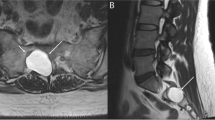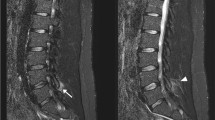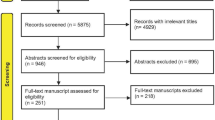Abstract
Spondylolysis is an osseous defect of the pars interarticularis, thought to be a developmental or acquired stress fracture secondary to chronic low-grade trauma. It is encountered most frequently in adolescents, most commonly involving the lower lumbar spine, with particularly high prevalence among athletes involved in certain sports or activities. Spondylolysis can be asymptomatic or can be a cause of spine instability, back pain, and radiculopathy. The biomechanics and pathophysiology of spondylolysis are complex and debated. Imaging is utilized to detect spondylolysis, distinguish acute and active lesions from chronic inactive non-union, help establish prognosis, guide treatment, and to assess bony healing. Radiography with satisfactory technical quality can often demonstrate a pars defect. Multislice CT with multiplanar reformats is the most accurate modality for detecting the bony defect and may also be used for assessment of osseous healing; however, as with radiographs, it is not sensitive for detection of the early edematous stress response without a fracture line and exposes the patient to ionizing radiation. Magnetic resonance (MR) imaging should be used as the primary investigation for adolescents with back pain and suspected stress reactions of the lumbar pars interarticularis. Several imaging pitfalls render MR imaging less sensitive than CT for directly visualizing the pars defects (regional degenerative changes and sclerosis). Nevertheless, the presence of bone marrow edema on fluid-sensitive images is an important early finding that may suggest stress response without a visible fracture line. Moreover, MR is the imaging modality of choice for identifying associated nerve root compression. Single-photon emission computed tomography (SPECT) use is limited by a high rate of false-positive and false-negative results and by considerable ionizing radiation exposure. In this article, we provide a review of the current concepts regarding spondylolysis, its epidemiology, pathogenesis, and general treatment guidelines, as well as a detailed review and discussion of the imaging principles for the diagnosis and follow-up of this condition.















Similar content being viewed by others
References
Rauch RA, Jinkins JR. Lumbosacral spondylolisthesis associated with spondylolysis. Neuroimaging Clin N Am. 1993;3:543–55.
Wiltse LL, Rothman SLG. Spondylolisthesis: classification, diagnosis and natural history. Semin Spine Surg. 1989;1:78–94.
Brooks BK, Southam S, Mlady GW, Logan J, Rosett M. Lumbar spine spondylolysis in the adult population: using computed tomography to evaluate the possibility of adult onset lumbar spondylosis as a cause of back pain. Skeletal Radiol 2009; doi:10.1007/s00256-009-0825-4
Rossi F. Spondylolysis, spondylolisthesis and sports. J Sports Med Phys Fit. 1988;18:317–40.
Wiltse LL. Etiology of spondylolisthesis. Clin Orthop. 1957;10:48–60.
Fredrickson BE, Baker D, McHolick WJ, Yuan HA, Lubicky JP. The natural history of spondylolysis, and spondylolisthesis in children and adolescents. J Bone Joint Surg Am. 1984;66:699–707.
Sonne-Holm S, Jacobsen S, Rovsing HC, Monrad H, Gebuhr P. Lumbar spondylolysis: a life long dynamic condition? A cross sectional survey of 4.151 adults. Eur Spine J. 2007;16:821–8.
Rowe GG, Roche MB. The etiology of separate neural arch. J Bone Joint Surg Am. 1953;35:102–9.
Grogan JP, Hemminghytt S, Williams AL, Carrera GF, Haughton VM. Spondylolysis studied with computed tomography. Radiology. 1982;145:737–42.
Teplick JG, Lafley PA, Berman A, Haskin ME. Diagnosis and evaluation of spondylolisthesis and/or spondylolysis on axial CT. AJNR Am J Neuroradiol. 1986;7:479–91.
Rothman SLG, Glenn WV. CT multiplanar reconstruction in 253 cases of lumbar spondylolysis. AJNR Am J Neuroradiol. 1984;5:81–90.
Wiltse LL, Widell EH, Jackson DW. Fatigue fracture: the basic lesion in isthmic spondylolisthesis. J Bone Joint Surg Am. 1975;57:17–22.
Albanese M, Pizzutillo PD. Family study of spondylolysis and spondylolisthesis. J Pediatr Orthop. 1982;2:496–9.
Turner RH, Bianco Jr A. Spondylolysis and spondylolisthesis in children and teen-agers. J Bone Joint Surg Am. 1971;53:1298–306.
Wynne-Davies R, Scott JHS. Inheritance and spondylolisthesis–a radiographic family survey. J Bone Joint Surg. 1979;61:301–5.
Troup JDG. Mechanical factors in spondylolisthesis and spondylolysis. Clin Orthop. 1976;147:59–67.
Goldstein JD, Berger PE, Windler GE, Jackson DW. Spine injuries in gymnasts and swimmers. An epidemiologic investigation. Am J Sports Med. 1980;19:463–7.
Saraste H. Long-term clinical and radiological follow-up of spondylolysis and spondylolisthesis. J Pediatr Orthop. 1987;7:631–8.
Wiltse LL. Spondylolisthesis: classification and etiology. In American Academy of Orthopaedic Surgeons: Symposium of the Spine. St. Louis: Mosby; 1969. p. 143–68.
Ward CV, Latimer B, Alander DH, et al. Radiographic assessment of lumbar facet distance spacing and spondylolysis. Spine. 2007;32:E85–8.
Zehnder SW, Ward CV, Crow AJ, Alander D, Latimer B. Radiographic assessment of lumbar facet distance spacing and pediatric spondylolysis. Spine. 2009;34:285–90.
Pope MH. Biomechanics of the lumbar spine. Ann Med. 1989;21:347–51.
Guillot M, Fournier J, Vanneuville G, et al. Mechanics of the characteristic geometry of the human spine undergoing vertical pressure. Rev Rhum Mal Osteoartic. 1988;55:351–9.
Wempner G, Talaslidis D. Von Mises yield criterion. In: Wempner G, Talaslidis D, editors. Mechanics of solids and shells. Theories and approximations. Boca Raton, FL. CRC Press; 2003. p. 168–9.
Tozeren A. Bodies in planar motion. In: Tozeren A, editor. Human body dynamics. Classical mechanics and human movements. New York: Springer; 2000. p. 84–116.
Mac-Thiong JM, Labelle H, Berthonnaud E, Betz RR, Roussouly P. Sagittal spinopelvic balance in normal children and adolescents. Eur Spine J. 2007;16(2):227–34.
Vialle R, Ilharreborde B, Danzac C, Lenoir T, Rillardon L, Guigui P. Is there a sagittal imbalance of the spine in isthmic spondylolisthesis? A correlation study. Eur Spine J. 2007;16:1641–9.
Blondel B, Jouve JL, Panuel M, et al. Pelvic incidence reliability in spine sagittal balance. Rev Chir Orthop Reparatrice Appar Mot. 2008;94:321–6.
Floman Y. Progression of lumbosacral isthmic spondylolisthesis in adults. Spine. 2000;25:342–7.
Mihara H, Onari K, Cheng BC, David SM, Zdeblick TA. The biomechanical effect of spondylolysis and its treatment. Spine. 2003;28:235–8.
Farfan HF, Osteria V, Lamy C. The mechanical etiology of spondylolysis and spondylolisthesis. Clin Orthop. 1976;117:40–55.
Sairyo K, Katoh S, Ikata T, Fujii K, Kajiura K, Goel VK. The pathomechanism of isthmic lumbar spondylolisthesis. Spine J. 2001;1(3):171–5.
Kajiura K, Katoh S, Sairyo K, Ikata T, Goel VK, Murakami RI. Slippage mechanism of pediatric spondylolysis: biomechanical study using immature calf spines. Spine. 2001;26(20):2208–012.
Sairyo K, Goel VK, Grobler LJ, Ikata T, Katoh S. The pathomechanism of isthmic lumbar spondylolisthesis. A biomechanical study in immature calf spines. Spine. 1998;23:1442–6.
Konz RJ, Goel VK, Grobler LJ, et al. The pathomechanism of spondylolytic spondylolisthesis in immature primate lumbar spines in vitro and finite element assessments. Spine. 2001;26(4):E38–49.
Ikata T, Miyake R, Katoh S, Morita T, Murase M. Pathogenesis of sports-related spondylolisthesis in adolescents. Radiographic and magnetic resonance imaging study. Am J Sports Med. 1996;24(1):94–8.
Sairyo K, Goel VK, et al. Three dimensional finite element analysis of the pediatric lumbar spine. II. Biomechanical change as the initiating factor for pediatric isthmic spondylolisthesis at the growth plate. Eur Spine J. 2006;15(6):930–5.
Sakamaki T, Katoh S, Sairyo K. Normal and spondylolytic pediatric spine movements with reference to instantaneous axis of rotation. Spine. 2002;27(2):141–5.
Labelle H, Roussouly P, Berthonnaud E, Transfeldt E, O’Brien M, Chopin D, et al. Spondylolisthesis, pelvic incidence, and spinopelvic balance: a correlation study. Spine. 2004;29:2049–54.
Marty C, Boisaubert b, Descamps H, Montigny JP, Hecquet J, Legaye J, et al. The sagittal anatomy of the sacrum among young adults, infants, and spondylolisthesis patients. Eur Spine J. 2002;11:119–25.
Hanson DS, Bridwell KH, Rhee JM, Lenke LG. Correlation of pelvic incidence with low- and high-grade isthmic spondylolisthesis. Spine. 2002;27:2026–9.
Legaye J, Duval-Beaupere G, Hecquet J, Marty C. Pelvic incidence: a fundamental pelvic parameter for three-dimensional regulation of spinal sagittal curves. Eur Spine J. 1998;7:99–103.
Postacchini F. The evolution of spondylolysis into spondylolisthesis during adult age. Ital J Orthop Traumatol. 1989;15:209–16.
Osterman K, Schlenzka D, Poussa M, et al. Isthmic spondylolisthesis in symptomatic and asymptomatic subjects, epidemiology, and natural history with special reference to disk abnormality and mode of treatment. Clin Orthop Relat Res. 1993;(297):65–70.
McGregor AH, Anderton L, Gedroyc WM, Johnson J, Hughes SP. The use of interventional open MRI to assess the kinematics of the lumbar spine in patients with spondylolisthesis. Spine. 2002;27:1582–6.
Axelsson P, Johnsson R, Strömqvist B. Is there increased intervertebral mobility in isthmic adult spondylolisthesis? A matched comparative study using roentgen stereophotogrammetry. Spine. 2000;25(13):1701–3.
Szypryt EP, Twining P, Mulholland RC, Worthington BS. The prevalence of disc degeneration associated with neural arch defects of the lumbar spine assessed by magnetic resonance imaging. Spine. 1989;14(9):977–81.
Turner PG, Hancock PG, Gren JH, et al. Back pain in childhood. Spine (Phila Pa 1976) 1989;14:812–814.
King HA. Back pain in children. Pediatr Clin N Am. 1984;31:1083–95.
Anderson SJ. Assessment and management of the pediatric and adolescent patient with low back pain. Phys Med Rehabil Clin N Am. 1991;2:157–85.
Smith JA, Hu SS. Management of spondylolysis and spondylolisthesis in the pediatric and adolescent population. Orthop Clin N Am. 1999;30:487–99.
Micheli LJ. Low back pain in the adolescent: differential diagnosis. Am J Sports Med. 1979;7:362–4.
Pizzutillo PD, Hummer CD. Nonoperative treatment for painful adolescent spondylolysis or spondylolisthesis. J Pediatr Orthop. 1989;9:538–40.
Wiltse LL, Jackson DW. Treatment of spondylolisthesis and spondylolysis in children. Clin Orthop. 1976;117:92–100.
Dreyzin V, Esses SI. A comparative analysis of spondylolysis repair. Spine. 1994;19:1909–14.
Amato M, Totty WG, Gilula LA. Spondylolysis of the lumbar spine: demonstration of defects and laminal fragmentation. Radiology. 1984;153:627–9.
Ravichandran G. A radiologic sign in spondylolisthesis. AJR Am J Roentgenol. 1980;134:113–7.
Maldague BE. Unilateral arch hypertrophy with spinous process tilt: a sign of arch deficiency. Diagn Radiol. 1976;121:567–74.
Hardley LA. Bony masses projecting into the spinal canal opposite a break in the neural arch of the fifth lumbar vertebra. J Bone Joint Surg. 1955;37:787–97.
Araki T, Harata S, Nakano K, Satoh T. Reactive sclerosis of the pedicle associated with contralateral spondylolysis. Spine. 1992;17:1424–6.
Saifuddin A, White J, Tucker S, Taylor BA. Orientation of lumbar pars defects; implications for radiographic demonstration and surgical management. J Bone Joint Surg Br. 1998;80:208–11.
Meyerding HW. Low backache and sciatic pain associated with spondylolisthesis and protruded intervertebral disk. J Bone and Joint Surg. 1941;23:461–6.
Wiltse LL, Winter RB. Terminology and measurement of spondylolisthesis. J Bone Joint Surg. 1983;65:768–72.
Leone A, Guglielmi G, Cassar-Pullicino VN, Bonomo L. Lumbar intervertebral instability: a review. Radiology. 2007;245:62–77. Review.
McGregor AH, McCarthy ID, Hughes SP. Motion characteristics of the lumbar spine in the normal population. Spine. 1995;20:2421–8.
Dvorak J, Panjabi MM, Chang D, Theiler R, Grob D. Functional radiographic diagnosis of the lumbar spine: flexion-extension and lateral bending. Spine. 1991;16:562–71.
Hayes MA, Howard TC, Grue CR, Kopta JA. Roentgenographic evaluation of lumbar spine flexion-extension in asymptomatic individuals. Spine. 1989;14:327–31.
Boden SD, Wiesel SW. Lumbosacral segmental motion in normal individuals: have we been measuring instability properly? Spine. 1990;15:571–6.
Hanley EN Jr. The indications for lumbar spinal fusion with and without instrumentation. Spine. 1995;20(24 Suppl):143–53S.
Hession PR, Butt WP. Imaging of spondylolysis and spondylolisthesis. Eur Radiol. 1996;6:284–90.
Dunn AJ, Campbell RS, Mayor PE, Rees D. Radiological findings and healing patterns of incomplete stress fractures of the pars interarticularis. Skeletal Radiol. 2008;37(5):443–50.
Campbell RS, Grainger AJ, Hide IG, Papastefanou S, Greenough CG. Juvenile spondylolysis: a comparative analysis of CT, SPECT and MRI. Skeletal Radiol. 2005;34(2):63–73.
Johnson DW, Farnum GN, Latchaw RE, Erba SM. MR Imaging of the pars interarticularis. AJR Am J Roentgenol. 1989;152:327–32.
Saifuddin A, Burnett SJD. The value of lumbar spine MRI in the assessment of the pars interarticularis. Clin Radiol. 1997;52:666–71.
Campbell RS, Grainger AJ. Optimization of MRI pulse sequences to visualize the normal pars interarticularis. Clin Radiol. 1999;54:63–8.
Hollenberg GM, Beattie PF, Meyers SP, Weinberg EP, Adams MJ. Stress reactions of the lumbar pars interarticularis: the development of a new MRI classification system. Spine. 2002;27(2):181–6.
Jinkins JR, Matthes JC, Sener RN, Venkatappan S, Rauch R. Spondylolysis, spondylolisthesis, and associated nerve root entrapment in the lumbosacral spine: MR evaluation. AJR Am J Roentgenol. 1992;159:799–803.
Ulmer JL, Elster AD, Mathews VP, King JC. Distinction between degenerative and isthmic spondylolisthesis on sagittal MR images: importance of increased anteroposterior diameter of the spinal canal (“wide canal sign”). AJR Am J Roentgenol. 1994;163:411–6.
Ulmer JL, Elster AD, Mathews VP, Allen AM. Lumbar spondylolysis: reactive marrow changes seen in adjacent pedicles on MR images. AJR Am J Roentgenol. 1995;164:429–33.
Ulmer JL, Mathews VP, Elster AD, Mark LP, Daniels DL, Mueller W. MR imaging of lumbar spondylolysis: the importance of ancillary observations. AJR Am J Roentgenol. 1997;169:233–9.
Saraste H, Broston LA, Aparisi T. Prognostic radiographic aspects of spondylolisthesis. Acta Radiol Diagn. 1984;25:427–32.
De Roos A, Kressel H, Spritzer C, Dalinka M. MR imaging of marrow changes adjacent to end-plates in degenerative disk disease. AJR Am J Roentgenol. 1987;149:531–4.
Modic MT, Steinberg PM, Ross JS, Masarik TJ, Carter JR. Imaging of degenerative disk disease: assessment of changes in vertebral body marrow with MR imaging. Radiology. 1988;166:193–9.
Grenier N, Kressel HY, Schiebler ML, Grossman RI. Isthmic spondylolysis of the lumbar spine: MR imaging at 1.5 T. Radiology. 1989;170:489–93.
Major NM, Helms CA, Richardson WJ. MR imaging of fibrocartilaginous masses arising on the margins of spondylolysis defects. AJR Am J Roentgenol. 1999;173:673–6.
Payne WK III, Ogilvie JW. Back pain in children and adolescents. Pediatr Clin N Am. 1996;43:899–917.
Elliot S, Hutson MA, Wastie ML. Bone scintigraphy in the assessment of spondylolysis in patients attending a sports injury clinic. Clin Radiol. 1988;39:269–72.
Papanicolaou N, Wilkinson RH, Emans JB, Treves S, Micheli LJ. Bone scintigraphy and radiography in young athletes with low back pain. AJR Am J Roentgenol. 1985;145:1039–44.
Ryan RJ, Gibson T, Fogleman I. The identification of spinal pathology in chronic low back pain using single photon computed tomography. Nucl Med Commun. 1992;13:497–502.
Collier BD, Johnson RP, Carrera GF, et al. Painful spondylolysis or spondylolisthesis studied by radiography and single photon emission computed tomography. Radiology. 1985;154:207–11.
Bellah RD, Summerville DA, Treves ST, Micheli LJ. Low back pain in adolescent athletes: detection of stress injury to the pars interarticularis with SPECT. Radiology. 1991;180:509–12.
Raby N, Mathews S. Symptomatic spondylolysis: correlation of CT and SPECT with clinical outcome. Clin Radiol. 1993;48:97–9.
Gregory PL, Batt ME, Kerslake RW, Webb JK. Single photon emission computerized tomography and reverse gantry computerized tomography findings in patients with back pain investigated for spondylolysis. Clin J Sport Med. 2005;15(2):79–86.
Mettler FA, Huda W, Yoshizumi TT, Mahadevappa M. Effective doses in radiology and diagnostic nuclear medicine: a catalog. Radiology. 2008;248:254–63.
Schauer DA, Linton OW. Ionizing radiation exposure of the population of the United States. National Council on Radiation Protection and Measurements—NCRP report N. 160. Health Phys. 2009;97(1):1–5.
Valentin J. Low-dose extrapolation of radiation-related cancer risk. Ann ICRP. 2005;35(4):1–140.
Steiner ME, Micheli LJ. Treatment of symptomatic spondylolysis and spondylolisthesis with the modified Boston brace. Spine. 1985;10:937–43.
Blanda J, Bethem D, Moats W, Lew M. Defects of pars interarticularis in athletes: a protocol for nonoperative treatment. J Spinal Disord. 1993;6:406–11.
Wu SS, Lee CH, Chen PQ. Operative repair of symptomatic spondylolysis following a positive response to diagnostic pars injection. J Spinal Disord. 1999;12:10–6.
Cheung EV, Herman MJ, Cavalier R, Pizzutillo PD. Spondylolysis and spondylolisthesis in children and adolescents. II. Surgical management. J Am Acad Orthop Surg. 2006;14:488–98.
Buck JE. Direct repair of the defect in spondylolisthesis. Preliminary report. J Bone Joint Surg Br. 1970;52:432–7.
Bradford DS, Iza J. Repair of the defect in spondylolysis or minimal degrees of spondylolisthesis by segmental wire fixation and bone grafting. Spine. 1985;10:673–9.
Kakiuchi M. Repair of the defect in spondylolysis. Durable fixation with pedicle screws and laminar hooks. J Bone Joint Surg Am. 1997;79:818–25.
Morscher E, Gerber B, Fasel J. Surgical treatment of spondylolisthesis by bone grafting and direct stabilization of spondylolysis by means of a hook screw. Arch Orthop Trauma Surg. 1984;103:175–8.
Songer MN, Rovin R. Repair of the pars interarticularis defect with a cable-screw construct. A preliminary report. Spine. 1998;23:263–9.
Zagra A, Giudici F, Minoia L, Corriero AS, Zagra I. Long-term results of pediculo-body fixation and posterolateral fusion for lumbar spondylolisthesis. Eur Spine J. 2009;1:151–5.
Johnson GV, Thompson AG. The Scott wiring technique for direct repair of lumbar spondylolysis. J Bone Joint Surg Br. 1992;74-B:426–30.
Reitman CA, Esses SI. Direct repair of spondylolytic defects in young competitive athletes. Spine J. 2002;2:142–4.
Rubery PT. Athletic activity after spine surgery in children and adolescents: results of a survey. Spine. 2002;15:423–7.
Acknowledgements
The authors wish to thank Walter Huda, Ph.D. from the Department of Radiology and Radiological Sciences, Medical University of South Carolina, Charleston, SC, for the “Radiation dose” paragraph text and Table 2 editing. In addition, the authors thank Steven Imbesi Associate Professor of Clinical Radiology from University of California, San Diego Medical Center, San Diego, California, for assistance in editing the manuscript.
Author information
Authors and Affiliations
Corresponding author
Rights and permissions
About this article
Cite this article
Leone, A., Cianfoni, A., Cerase, A. et al. Lumbar spondylolysis: a review. Skeletal Radiol 40, 683–700 (2011). https://doi.org/10.1007/s00256-010-0942-0
Received:
Revised:
Accepted:
Published:
Issue Date:
DOI: https://doi.org/10.1007/s00256-010-0942-0




